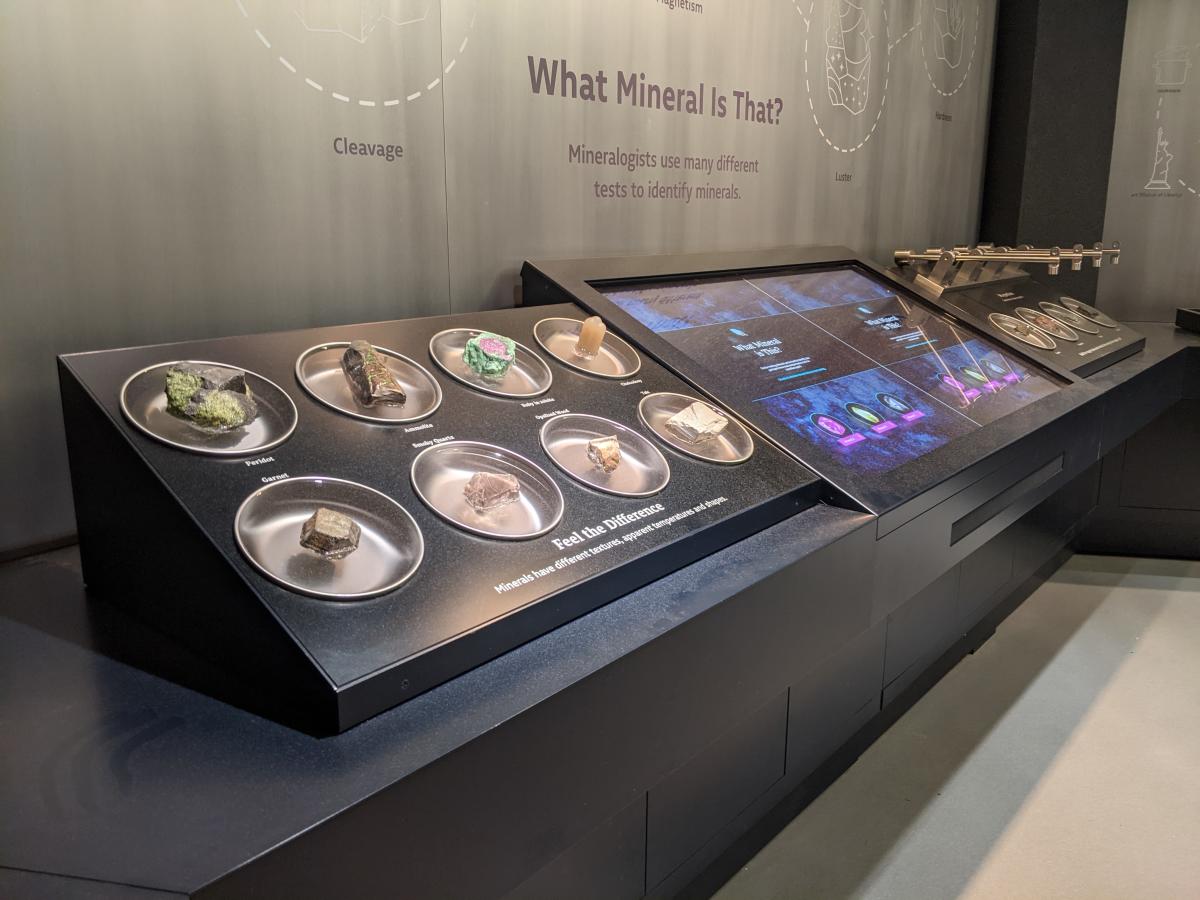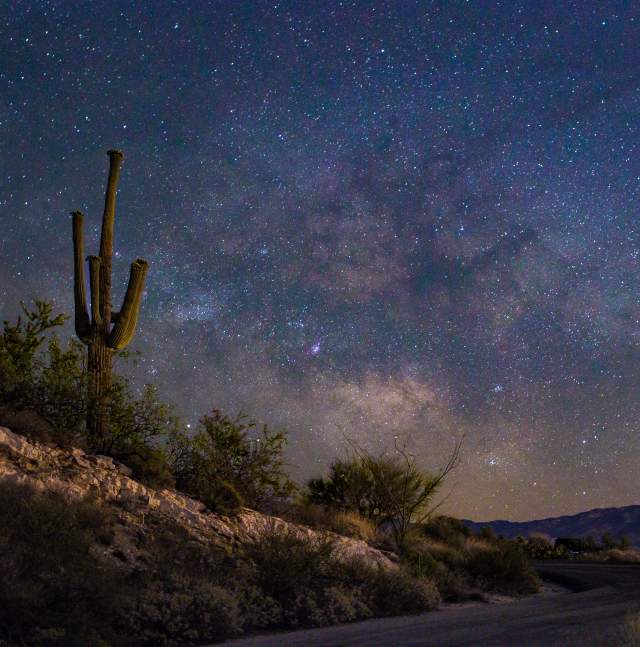Star Trails In Tucson
Discover Tucson’s captivating stargazing itinerary featuring world-renowned observatories, immersive nighttime programs, and breathtaking views of the cosmos. Dive into hands-on astronomy experiences at Kitt Peak, Mt. Lemmon SkyCenter, and more, with dining and lodging options that complement your celestial journey. Perfect for astronomy enthusiasts and adventure seekers alike.
Day 1: Flandrau Science Center & Caris Mirror Laboratory
Flandrau Science Center and Planetarium on the University of Arizona (UA) campus is a local favorite! (U.S. News & World Report ranks the UA #5 in the USA for space science!) Explore the solar system and beyond in Flandrau’s state-of-the-art planetarium theater, featuring a full-dome digital projection system that launches from the Earth and flies to planets, moons, and asteroids. Flandrau – celebrating their 50th anniversary in 2025 - also offers fun, interactive science exhibits for the whole family: Planetarium Show Times
The Steward Observatory Richard F. Caris Mirror Laboratory, also on the UA campus, offers a 90-minute tour on how innovative engineering and optical technology melds with manufacturing techniques to produce the largest and most advanced giant (8.4 m. / 27 ft.) telescope mirrors in the world. See the unparalleled technology in making the next generation of telescopes that will explore deep into outer space. These new generation giant optical telescopes will change how we explore the Universe! For more, visit: https://mirrorlab.arizona.edu/content/tours-tickets
Dining recommendation: Fuel up for your adventures in Tucson at local favorite The Cup Café, located in the historic Hotel Congress downtown. Their creative menu features twists on classic favorites and homemade desserts in a warm and eclectic atmosphere.
Day 2: Kitt Peak National Observatory (KPNO) & UA’s Mt. Lemmon SkyCenter
Kitt Peak National Observatory (KPNO) offers the rare opportunity for visitors to view its large research telescopes on both its daytime and nighttime tours. Book a tour and enjoy lunch or dinner. Kitt Peak also offers nighttime viewing experiences: https://kpno.noirlab.edu/tours-programs/nighttime-programs/, and an exclusive Overnight Telescope Observing Program.
Established in 1958, Kitt Peak National Observatory is proud to operate on the land of the Tohono O'odham Nation. The first telescopes were built in the early 1960s on the mountain at 2,096 m (6,877 ft). There are 22 distinct observatories with more than 30 telescopes on Kitt Peak, making it one of the largest collections in the world. Kitt Peak is run by the National Science Foundation funded NOIRLab (National Optical-Infrared Astronomy Research Laboratory), managed by the Association of Universities for Research in Astronomy (AURA) under a cooperative agreement with NSF.
PM Activity
Embark on an extraordinary celestial journey with the “SkyNights” program at Mt. Lemmon SkyCenter, ranked #1 by the Space Tourism Guide in their list, “The Best Observatories in the U.S. to Visit in 2024”. Led by expert science communicators, delve into the mysteries of the cosmos, savor a delicious light dinner, and witness a mesmerizing mountaintop sunset. As darkness blankets the sky, peer through state-of-the-art telescopes – the largest dedicated public telescopes in the Southwest – and discover the breathtaking beauty of distant galaxies, vibrant nebulae, neighboring planets, and other awe-inspiring celestial wonders. https://skycenter.arizona.edu/plan-your-visit/programs/skynights
Dining recommendation: Plot out your final day in Tucson over breakfast, lunch, or dinner at Five Points Market & Restaurant. A sun-lit, modern spot featuring New American dishes, espresso drinks & a small grocery market full of local gifts and sundries. Closed Wednesdays and Thursdays.
Day 3: Alfie Norville Gem & Mineral Museum & Fred Lawrence Whipple Observatory
Other Special “Starry” Mentions
A meteorite “pebble” from the asteroid Bennu, collected by NASA’s University of Arizona-led OSIRIS-REx mission is at the Alfie Norville Gem & Mineral Museum; one of only three places in the world to display an extraterrestrial rock sample collected in space, other than the moon.
Fred Lawrence Whipple Observatory (FLWO)
Feel like hitting the road? Just 45 minutes south of Tucson is the Fred Lawrence Whipple Observatory (FLWO); part of the Center for Astrophysics | Harvard & Smithsonian, on Mount Hopkins in the scenic Santa Rita Mountains (a “Sky Island” due to its elevation relative to the desert floor). Alongside its status as an observatory, it is dedicated to astrophysics education via the newly reopened Visitor & Science Center, the MMT Observatory, and a Smithsonian gift shop.
Dining recommendation: Sky Bar/Brooklyn Pizza is the only place in Tucson to enjoy the night sky and a great slice of pizza! Sky Bar’s tagline is “Solar Powered Cafe by Day, Astronomy Bar by Night” – and it’s 100% accurate. Enjoy peering through telescopes on their patio nightly; astronomers are on hand to answer questions and help gazers take photos Friday and Saturday nights. For Astronomy Hours and more: Sky Bar Tucson Astronomy

Special Mentions
Tucson's Astro Trail
Tucson is renowned for its exceptionally dark skies, minimal light pollution, and unique variety of astronomical attractions — making it a paradise for stargazers, researchers, and curious minds alike. The remarkable combination of natural beauty and scientific discovery provides an ideal canvas for observing the cosmos.
Saguaro National Park: Urban Night Sky Place
The National Park Service and DarkSky International certified Saguaro National Park as the newest “Urban Night Sky Place”. This certification recognizes sites that are near to, or surrounded by, large urban areas, and whose planning and design actively promote an authentic nighttime experience in the midst of significant artificial light at night. Saguaro National Park joins eight other Urban Night Sky Places around the world and is only the second National Park Service unit to receive this coveted certification.
Catalina State Park’s Star Party dark nighttime skies are ideal for astronomical observation. Imagine what you can see through a high-powered telescope! Astronomers from the Tucson Amateur Astronomy Association are onsite to answer questions and discuss celestial objects and phenomena. Bring water, snacks, and a jacket, and a red light if you have one. Weather permitting. Event is free with park entrance fee. Dates vary. See Catalina State Park Tucson Star Party events.
Arizona Star Tours is a mobile observatory that brings large telescopes and knowledgeable astronomers to you for an enlightening tour of the universe. With a telescope that’s all yours for the night and the attention of an astronomer to guide you, it’s an extraordinary experience. See the moon, galaxies, star clusters, nebulae, double stars and planets through the largest compound tracking telescope that a person can move.
Lodging Recommendation: Loews Ventana Canyon Resort, on Tucson’s rugged northeast side, offers stargazing with University of Arizona professors for guests three times per week.



